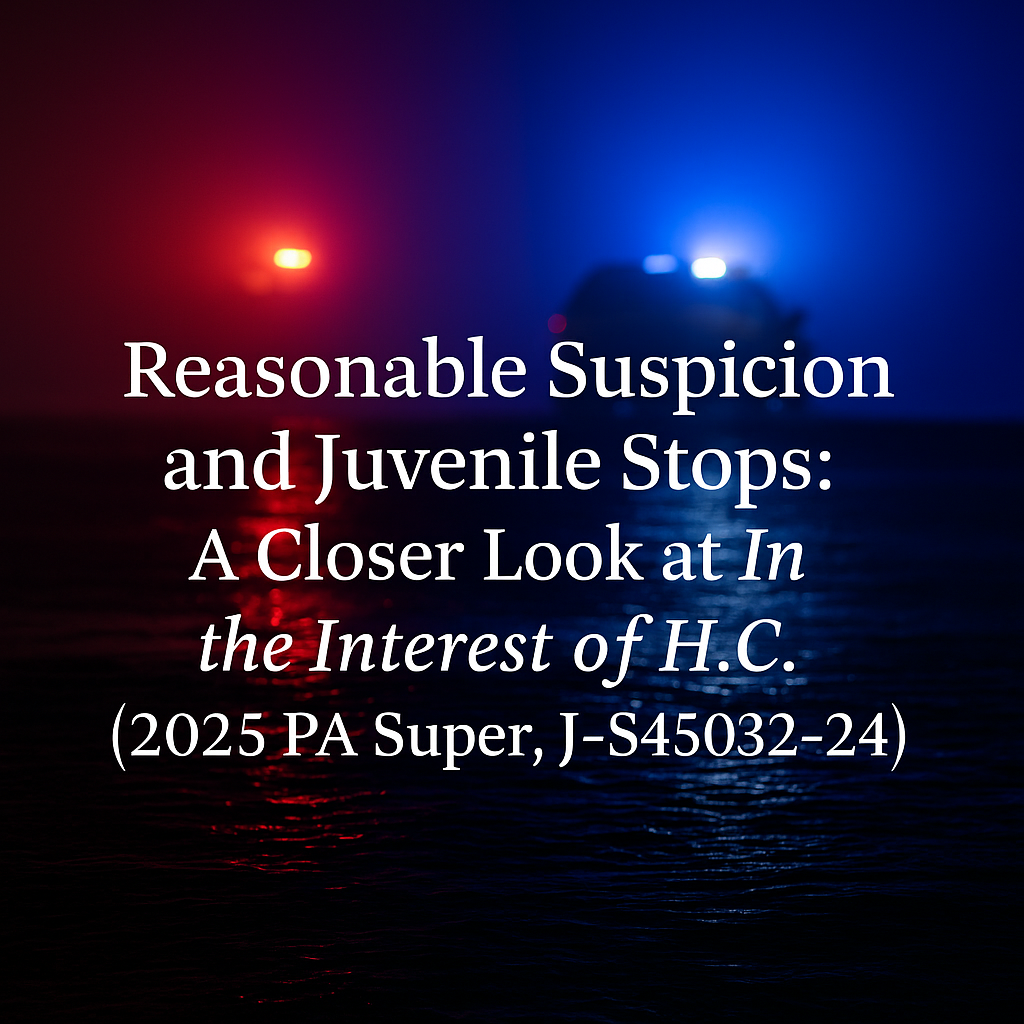Reasonable Suspicion and Juvenile Stops: A Closer Look at In the Interest of H.C. (2025 PA Super, J-S45032-24)
June 9, 2025

Case Background
The case arose from a February 2024 encounter in Lycoming County between a juvenile, H.C., and Sergeant Brian McGee of the local police department. While on routine patrol, McGee entered a Conoco gas station parking lot and observed two individuals, including H.C., wearing balaclava-style face masks, dark clothing, and sweatshirts. One of them had his hands in his waistband, appearing to hold something.
Although the weather was mild — with temperatures in the high 40s to low 50s — the juveniles were dressed in a way that McGee interpreted as abnormal for the conditions. Additionally, H.C. appeared unusually focused on McGee’s movements and changed his direction of travel after seeing the officer. McGee’s suspicions were heightened because a nearby store had recently been robbed by a juvenile in similar attire.
Sergeant McGee followed the juveniles, who ultimately attempted to elude him by redirecting their path. When McGee finally approached them on foot and attempted to detain them, H.C. fled. He was later charged with defiant trespass and evading arrest on foot.
Trial Court Ruling
The juvenile court granted H.C.'s motion to suppress and dismissed the delinquency petition. The court reasoned that H.C. had merely been walking down the street and that Sergeant McGee lacked specific, articulable facts to justify an investigatory stop. It also held that H.C.’s subsequent flight and any resulting evidence were fruit of an illegal stop and thus inadmissible.
Superior Court Reversal
On appeal, the Superior Court reversed. Writing for the panel, Judge McLaughlin concluded that the trial court erred as a matter of law by failing to credit the totality of the circumstances supporting reasonable suspicion.
The Superior Court emphasized several key points:
Facial Coverings and Behavior Consistent with Evasion
The juveniles’ use of balaclavas in relatively mild weather raised legitimate concerns about intent to conceal identity. Combined with their redirection of movement upon seeing police, the court found this behavior suspicious.Law Enforcement Training and Experience Matter
The court noted that the officer’s inference — that H.C. and his companion were attempting to avoid police contact — was reasonable based on his training and prior experience, especially given a recent robbery involving similar suspect descriptions.More Than Innocuous Conduct
While any one factor in isolation may have seemed benign, the court reiterated longstanding precedent: “a combination of circumstances, none of which taken alone would justify a stop, may be sufficient” to meet the reasonable suspicion threshold. Here, that combination included:Unseasonal face coverings
Unusual interest in police presence
Abrupt change in path to avoid the officer
Similarity to recent criminal activity nearby
Legal Precedents Applied
The panel relied on prior Pennsylvania Superior Court rulings such as Commonwealth v. Carter and Commonwealth v. Dix, where evasive conduct and unusual concealment behavior justified stops. In those cases, the court found that the police were entitled to act on inferences drawn from seemingly minor but collectively significant conduct.
Key Takeaways
“Mere presence” is not enough, but context matters: The court clarified that an officer’s observations, even of otherwise legal behavior, may establish reasonable suspicion if viewed through the lens of experience and recent events.
Flight plus suspicion equals lawful stop: Although flight alone does not justify a stop, it can tip the scale when added to a chain of suspicious behavior.
Juvenile status does not change the standard: The court applied the same reasonable suspicion framework to H.C., even though he was a juvenile, affirming the broader legal principles that govern investigatory detentions.
Conclusion
In the Interest of H.C. serves as a reminder that reasonable suspicion is a flexible, fact-sensitive doctrine. The Superior Court’s decision reinforces law enforcement’s ability to make quick assessments of potentially criminal behavior when supported by articulable facts, while also delineating the limits of judicial suppression based on perceived innocence. For defense attorneys and prosecutors alike, the case offers a detailed roadmap for analyzing future suppression motions involving investigatory stops. The Pennsylvania Superior Court’s recent decision in In the Interest of H.C. addresses the delicate balance between individual constitutional protections and law enforcement’s authority to conduct investigatory stops. Specifically, the court reversed a trial court’s order suppressing evidence and dismissing delinquency charges against a juvenile, ruling that the police had reasonable suspicion to stop him based on a pattern of behavior that warranted further investigation.
